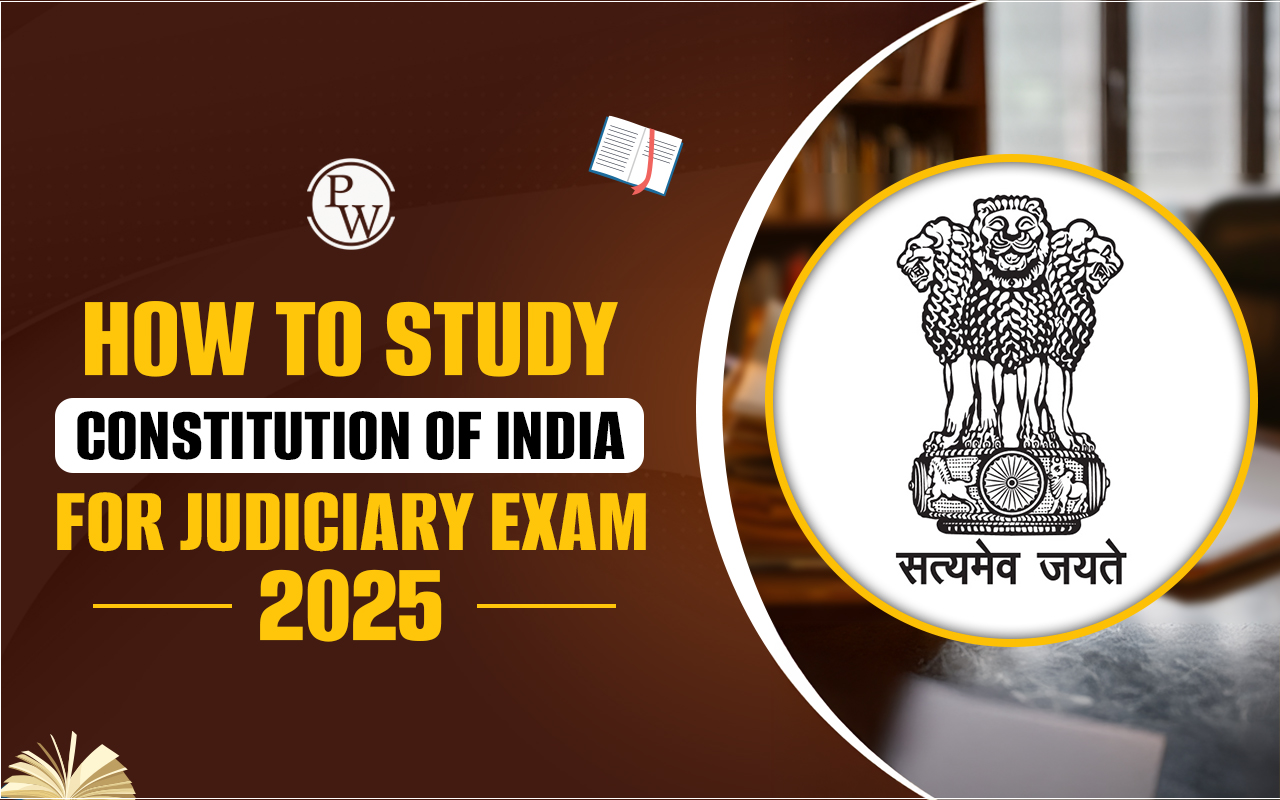
How to Study Constitution Of India for Judiciary Exam 2025: The Constitution of India is a fundamental part of the Judiciary Exam syllabus. As one of the most significant subjects in this exam, mastering it is essential for aspiring judicial officers. It provides the framework for the governance of the country and outlines the rights and duties of citizens. To study Constitution of India effectively can become a difficult task due to its complexity and depth. However, with a systematic approach and consistent practice, it is possible to gain a thorough understanding.
On this page, we will get to know How to study Constitution of India for Judiciary Exam 2025 , offering insights and strategies for mastering this subject. This will include a comprehensive overview of the Constitution, key sections to focus on, and tips & tricks to remember important concepts.
Constitution Of India for Judiciary Exam 2025 Overview
The Constitution of India acts as the supreme law that governs the political structure, legal framework, and the relationship between the state and individuals. It is divided into various parts and is organized into 448 Articles spread across 25 Parts. The Constitution also contains 12 Schedules, with each Schedule dealing with specific aspects such as the allocation of powers and responsibilities between different levels of government.
While studying Constitution of India for Judiciary Exam 2025, understanding the historical context, evolution, and interpretation of the Constitution is essential. It is not just about learning provisions but also about understanding how different Articles, provisions, and schedules interlink with each other. This knowledge is essential for answering questions related to constitutional law, governance, and legal principles.
7 Tips to Study Constitution Of India for the Judiciary Exam 2025
To Study the Constitution of India for Judiciary Exam 2025, it's essential to approach it with a structured plan and a deep understanding of its core principles. The Constitution is the backbone of Indian governance and law, and mastering it is crucial for your success in the exam. Whether answering objective questions or descriptive questions, a strong understanding of the Constitution will help to navigate through a variety of complex legal concepts. Here are 7 tips to help you study Constitution Of India for the Judiciary Exam 2025 effectively and boost your chances of success in the Judiciary Exam 2025.
1. Start with the Preamble and Fundamental Rights
The Preamble is a vital part of the Constitution and sets out the goals and values of the Indian State. Start your study with a deep understanding of the Preamble. Then, focus on Part III of the Constitution, which deals with Fundamental Rights. Knowing the rights, their limitations, and judicial interpretations will help you tackle questions on individual freedoms and constitutional remedies effectively.2. Understand the Structure of Government
The Constitution of India establishes a federal structure, comprising the Union Government and the State Governments. Part V and Part VI of the Constitution focus on the Union and States respectively. These parts outline the executive, legislature, and judiciary of both levels of government. Understanding the distribution of powers between the Centre and States is required for both objective and descriptive questions.3. Focus on Key Articles and Provisions
While the Constitution is extensive, certain Articles are more frequently tested in the Judiciary Exam. The Important Articles of the Constitution of India for Judiciary Exams 2025 include Articles related to the Preamble, Fundamental Rights, Directive Principles of State Policy, and Emergency Provisions. In addition, Articles that deal with the Judiciary, such as the appointment of judges, judicial review, and separation of powers, should be thoroughly studied.
4. Revise Schedules of the Indian Constitution
The Schedules of the Indian Constitution contain crucial details related to various aspects of governance. These Schedules define the allocation of legislative powers, administrative matters, and jurisdiction of courts. Some of the most important Schedules include:
- First Schedule : States and Union Territories.
- Second Schedule : Emoluments of public officials.
- Third Schedule : Oaths of office.
- Fourth Schedule : Allocation of seats in the Rajya Sabha.
5. Solve Previous Year Papers
Solving previous year's papers helps you get familiar with the pattern and types of questions asked in the Judiciary Exam. This will give you a sense of which topics are important and how to approach your study of the Constitution of India. Make sure to review the questions on constitutional law, fundamental rights, and the structure of the government to enhance your understanding.6. Make Concept Maps and Diagrams
The Constitution can seem overwhelming, especially with the number of articles and sections. One of the best ways to simplify the information is by creating concept maps and diagrams. These visual tools help you connect related Articles and provisions, making it easier to retain complex legal information. For example, create a flowchart to understand the process of judicial review or the structure of the Union Judiciary.
7. Regular Revision and Time Management
Constitutional provisions are extended and revisiting them multiple times will help strengthen your memory. Create a study schedule with regular revisions, focusing on the weaker sections. Time management is essential during preparation, so break your study sessions into manageable intervals to ensure maximum retention.
Tips & Tricks to Study Constitution Of India for Judiciary Exam 2025
Here are some tips & tricks that can help you retain the key provisions of the Constitution of India:-
Mnemonics
: Creating mnemonics or memory helps to recall lengthy Articles or specific Schedules. For instance:
- For the Fundamental Rights (Articles 12–35), use the acronym "Right to FREEDOM JUSTLY ENSURES RIGHTS."
- To remember the Schedules of the Indian Constitution, associate each schedule with a visual image or a story.
- Current Affairs Linkage : Relate current events with constitutional provisions. Understanding how the Constitution applies in real-life situations helps strengthen your knowledge and makes it more applicable.
- Focus on Landmark Cases : Study important landmark judgments that have shaped the interpretation of the Constitution. These cases often appear in exams and are critical for answering questions on constitutional law.
- Use Revision Notes : Make concise notes for each topic, summarizing key Articles, Schedules, and concepts. These notes will be useful for quick revisions closer to the exam date.
Important Articles of the Constitution Of India for Judiciary Exams 2025
Here is a curated list of Articles frequently emphasized in judiciary exams:- Articles 12–35 : Fundamental Rights
- Article 51A : Fundamental Duties
- Articles 36–51 : Directive Principles of State Policy
- Articles 52–151 : Executive powers at the Union and State levels
- Articles 245–263 : Legislative Relations between Union and States
- Articles 352–360 : Emergency provisions
Study Constitution Of India for Judiciary Exam 2025 FAQs
Q1. Why should I Study Constitution of India for Judiciary Exam 2025?
Q2. What sections of the Constitution should I focus on for Judiciary Exam?
Q3. How can revising the Schedules of the Constitution help in Judiciary Exam preparation?
Q4. What role does judicial review play in the Constitution for the Judiciary Exam?
Q5. How should I approach time management while studying the Constitution for Judiciary Exam?













